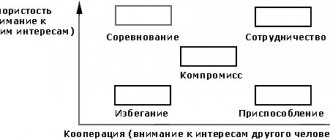Helping people who find themselves in difficult life situations is an act of goodwill that one day may come back to you like a boomerang. None of us are immune from this. There can be many reasons for a life crisis and they are individual for everyone. True, in their grief people are very similar. Powerlessness and the inability to change the situation often forces us to commit rash actions that entail even more serious consequences. Many, finding themselves in difficult circumstances, completely give up and stop fighting. The consequences of such a crisis can be very serious - that is why it is so important to support a person in a timely manner and provide assistance to those in need.
Help for people who find themselves in difficult life situations is today provided at the state level within the framework of federal and other programs, as well as various charitable organizations. But all these organizations, programs and funds that provide assistance to people in difficult life situations have a big drawback - the restrictions imposed by the charter and regulations. Unfortunately, many people who turned to officials and philanthropists for help were greatly disappointed and lost faith that anyone could care about other people’s problems.
What does “difficult life situation” mean?
TLC can be characterized as neediness in the sphere of social existence. If a citizen has a need in material, housing or socio-psychological terms and cannot get out of it without the support of the state, then it is considered that he is in a difficult life situation (situation).
Concept in law
The state in Federal Law No. 195 of the Russian Federation of December 10, 1995 “On the fundamentals of social services for the population in the Russian Federation,” based on paragraph 4 of Article 3, defines that a difficult life situation is such circumstances in which a person’s life activity as a citizen , violated due to objective reasons. At the same time, the legislation considers one of the criteria to be the inability to independently resolve the current critical situation.
The following factors may be considered the reason for this:
- illness or disability;
- senile incapacity or loneliness;
- abuse of children by parents, as well as their absence (one or both);
- lack of own housing or a specific place to live.
This rightfully includes unemployment or low-income families (individual citizens).
Important! Unemployment, as one of the conditions of the current housing cooperative agreement, is today the reason that causes the inability to pay a mortgage. As a result of late bank payments, the creditor seizes the apartment to pay off the debt, thereby complicating the difficult situation with the lack of housing and money for living.
Another option for designating a difficult situation in the lives of citizens can be read in Federal Law No. 178 “On State Social Assistance” (as amended on November 23, 2018). There, TLC is defined as one or more circumstances that worsen the living conditions of citizens, and consequences that they cannot cope with on their own.
The concept of THS
Medical rehabilitation
While a person is healthy, he does not feel how difficult it is for those who are bedridden. Help in difficult life situations for seriously ill patients must be carried out systematically. How to do it? Show increased attention to their desires and take into account the lack of communication. Think about how you can help your neighbor, friends or parents.
Factors and structure in social work
Active life position - what is it?
TJS is a position in social work that is determined by the social protection authorities directly when assessing the degree of disruption of a citizen’s connections with his surrounding society and living conditions. As a result of the analysis of the situation, social services determine the scale and direction of assistance from the state.
Proven! A problematic situation can arise both due to a citizen’s own actions and due to the influence of external factors. In any case, the person cannot live and function normally, and he needs help.
The occurrence of THS can be judged by the following signs:
- inconsistency of an individual’s social behavior with generally accepted norms;
- partial or complete disruption of an individual’s social functions;
- the emergence of new demands made by the environment on a person in need;
- uncertainty or lack of prospects for changing the situation.
This also includes the appearance of a stressful state in the subject, which arises in the process of worsening TJS.
The TZS structure includes:
- participants involved in the events in question;
- actions that take place in the THS;
- spatial and temporal coordinates within which the situation is considered;
- individual experiences and how the individual sees and understands the problem situation.
Working with a client, the specialist assesses his subjective and objective inability to cope with the situation and develops a number of the most optimal ways to overcome it.
Objective and subjective family difficulties
Loss of a loved one
Despite the external similarity with the previous case, the situation in this context may be very different. If the loss of relatives and loved ones is almost always associated with death, then the loss of a loved one can also occur as a result of divorce or infidelity. For many, it is synonymous with the devaluation of life. In this situation, the help of a specialist psychologist is important and necessary in order to help the individual find strength for future life and activities.
Help in a difficult life situation like this should be built on the gradual building of long-term perspectives. It is necessary to explain to a man or woman that life does not end there.
Types of problematic (difficult) situations
There are quite a lot of causes and types of TJS. Doctor of Psychology, specialist in conflict management, A.Ya. Antsupov, proposes a division of problematic life moments in the following areas:
- related to human activity: professional or domestic, emergency or extreme situations;
- based on interpersonal relationships: relationship problems, pre-conflict moments, conflict incidents;
- arising as a result of intrapersonal problems: conflicts, difficulties, crises;
- caused by everyday (everyday) situations: danger, uncertainty, loss.
Conflict of interest - what kind of situation is it?
Experts emphasize that TLC can be characterized by the presence of a difficult situation, an imbalance between opportunities and requirements for activity, as well as the activity of personal motives.
There is a less complex division of THS into two types: first and second.
The first type is social HOAs
This includes troubles that arise in the course of life associated with everyday moments. The first type includes difficulties of a temporary nature and with the prospect of restoring the usual way of life.
By the way! The occurrence of such moments in life is influenced only by the individual himself. Personally, he creates them through his actions, experiences them himself and receives negative experiences.
The second type is extreme
The result of such life moments is considered to be a state of “mental breakdown” or “physical survival.” This type includes severe loss in the course of life.
For your information! The second type includes extreme natural, anthropogenic and man-made situations, as well as their complex consequences that manifest themselves over time.
Emergency situations caused by natural disasters accompany humanity at all stages of existence. These are forces beyond control, but people, trying to master them, on the contrary, can not eliminate, but provoke the emergence of new excesses.
Technogenic (technical) and anthropogenic (ecological) crises are the result of the action or inaction of humanity in the process of promoting technological progress and life on the planet.
An example of this is the pollution of the environment and natural lands with industrial waste: mechanical or chemical (emissions into the atmosphere, discharge into rivers and seas, and other actions).
Finding yourself in difficult situations, a person begins to experience mental tension, which prevents him from adequately assessing the situation and independently finding a way out.
Types of mental tension in TJS
Phases of living through a difficult situation
Life position - what does it mean?
When overcoming difficult moments in life, a person goes through several stages. They depend on the degree of social adaptation of the individual and life competence (knowledge). They can be divided into the following several phases:
- unconscious knowledge - the experience a citizen has that he uses in non-problematic life situations;
- unconscious ignorance - the use of habitual competence in an already changed situation, which cannot give the expected result, but the person does not yet understand this;
- conscious ignorance - searching for an alternative, accumulating information, trying to make internal restructuring and understand one’s capabilities;
- conscious knowledge is the moment when the direction of action is determined, but its implementation has not yet been brought to automaticity and occurs through a set of trials, errors and analysis of the results.
When using conscious knowledge (competence), a person gains experience that gives him the opportunity to remain in the phase of unconscious knowledge in the future. This allows you to put any difficult life situation on the level of everyday life and solve it.
Model of adaptation to THS
Disasters
This includes earthquakes, floods, fires, and terrorist attacks. In all these incidents, a person becomes overwhelmed by circumstances. Someone is left homeless, without food and warm clothing. How can you not lose faith in yourself and your capabilities? This is what a difficult life situation can lead to. Overcoming difficulties begins with the desire to change something in yourself, and then in the world around you.
Thus, it is important for a person in difficult living conditions to provide psychological assistance as soon as possible: moral support, financial assistance, and assurance that all the problems he has encountered have a solution.
Help in difficult life situations
Among difficult life situations, social protection authorities pay the closest attention to dysfunctional families where the child suffers from a lack of understanding on the part of the parents. Particular attention is paid to low-income and single-parent families in which a teenager misses school due to low financial status.
In this case, the state, in accordance with the provisions approved by law, can take the following measures:
- monetary assistance in the form of subsidies, various compensations and pensions (for loss of a breadwinner, disability, etc.);
- improvement of living conditions;
- free psychological support;
- rehabilitation medical care in special institutions: sanatoriums, dispensaries and rehabilitation and other health centers;
- assistance in obtaining further education on a budgetary basis.
In particularly difficult situations, where the participants are minor children, the guardianship and trusteeship authorities are involved in solving the problem. In Russia, this is a special state executive body that controls the treatment of children.
Attention! The main goal of assistance in a difficult situation is to help the person in need adapt to the new prevailing living conditions and stabilize the situation.
Adaptation can be either favorable (the individual takes an active position) or unfavorable (the person simply adapts).
A person who finds himself in a difficult life situation can count on outside help. In order to cope with problems and stabilize his life, a citizen must make his contribution in the form of working on himself to acquire an active life position.











